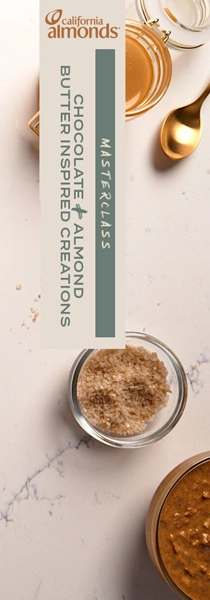
- Industry news
Industry news
- Category news
Category news
- Reports
- Key trends
- Multimedia
- Journal
- Events
- Suppliers
- Home
- Industry news
Industry news
- Category news
Category news
- Reports
- Key trends
- Multimedia
- Events
- Suppliers
“Honest price for an honest crust”: Real Bread Campaign advocates for sustainable, nutritious bread making

04 Dec 2019 --- Bread: a warm, welcoming staple food in several cultures, but in light of globalization, bread producers are finding quicker and cheaper ways to maximize their profits while compensating for quality. In this context, Sustain: The alliance for better food and farming has been running the project “Real Bread Campaign” for over ten years, which seeks to promote sustainable, nutritious offerings and bread production. Where loaves are regarded as more than a mere commodity, the campaign places high value on each individual loaf, as well as the craft and skill of the bakers who make them.
The Real Bread Campaign unites bakers to challenges misleading marketing of industrial and supermarket loaves, the organization says. Its mission is to raise awareness of the issues around additives and hidden processing aids, as well as sharing the benefits of locally-baked bread compared to what it refers to as “adulterated imitations.” 
Campaign Coordinator at Real Bread, Chris Young tells FoodIngredientsFirst that the reasons for buying Real Bread from an authentic artisanal bakery vary from person to person, and bakery to bakery. “They might include knowing they are getting a delicious loaf that has been made without additives and supporting a business that’s creating skilled, local jobs and helping to keep their high street alive,” he says.
 Industrial bakeries often overshadow local bakeries' craft and skill. Bee Farrell, Public Food Anthropologist and Ph.D. candidate in Digital and Food Anthropology at the University of Kent, also tells FoodIngredientsFirst that consumers are often willing to pay more for artisanal bread than conventional supermarket loaves as the former help support local businesses and small-scale entrepreneurs.
Industrial bakeries often overshadow local bakeries' craft and skill. Bee Farrell, Public Food Anthropologist and Ph.D. candidate in Digital and Food Anthropology at the University of Kent, also tells FoodIngredientsFirst that consumers are often willing to pay more for artisanal bread than conventional supermarket loaves as the former help support local businesses and small-scale entrepreneurs.
Financial feasibility
Although there may not be “much dough to be made in small-scale bakery,” Young muses, he also advocates for all bakers to char an “honest price for an honest crust.”
“Bakers need to be careful at balancing their costs and income to stay in business. The values of intuition and craft become tangible in the shape and taste of a delicious, nutritious, additive-free loaf, as well as a bakery that’s an integral part of a local community. A good Real Bread bakery doesn’t have to fake those things,” Young explains. Besides all-natural, healthy food, the group’s charity work also prioritizes well-paid, meaningful jobs to benefit local economies and communities as well as environmentally sound farming.
Farrell reveals a variety of ways in which bakeries can expand their farinaceous portfolios, such as diversifying bread products into lunch sandwiches and offering pastries and bread-baking workshops. She also identifies building up regular customer feedback as a key to success.
What’s in the bread?
The campaign defines “Real Bread” as bread made with simple, natural ingredients without artificial additives or processing aids. Moreover, it questions why bakers who make bread in a time-consuming, natural way have to qualify it with labels, such as “real,” “artisanal,” and “craft.” On the contrary, the Real Bread Campaign advocates for industrial loaf fabricators to come up with a new name for their “additive-laden products.”
 At its simplest, Real Bread can be made with just flour, water and salt, Young says.Based in the UK, Farrell says that fundamental ingredients for her artisanal loaves are flour from Shipton Mill or the Woodbridge Tide Mill in Suffolk, Suffolk sea salt, tap water and time. “The single criterion in our definition of Real Bread is that it is made without so-called processing aids or other additives. It’s up to each bakery where to buy their flour, but we encourage local farmers and smaller, independent mills to look beyond off-the-peg roller milled white from a multinational,” Young adds. These kinds of loaves also often integrate mixes of grains, nuts, seeds and heritage grains, Farrell chimes in.
At its simplest, Real Bread can be made with just flour, water and salt, Young says.Based in the UK, Farrell says that fundamental ingredients for her artisanal loaves are flour from Shipton Mill or the Woodbridge Tide Mill in Suffolk, Suffolk sea salt, tap water and time. “The single criterion in our definition of Real Bread is that it is made without so-called processing aids or other additives. It’s up to each bakery where to buy their flour, but we encourage local farmers and smaller, independent mills to look beyond off-the-peg roller milled white from a multinational,” Young adds. These kinds of loaves also often integrate mixes of grains, nuts, seeds and heritage grains, Farrell chimes in.
Concerning the taste-visual appeal ratio, both Farrell and Young agree that there should be no compromise on either. Neither should they be exclusive, as the visual aspect of handmade bread has a deeply hard-wired attraction against uniform, mass-produced loaves, Farrell says.
“Great looking loaves should bring a shopper to the bakery counter. Great tasting loaves should turn that person into a loyal customer, who keeps coming back for more,” Young affirms. This baking philosophy comes in response to consumers’ rising demand for “natural and honest loaves,” says the campaign.
By Anni Schleicher











